Advice for the College Transfer Swimmer
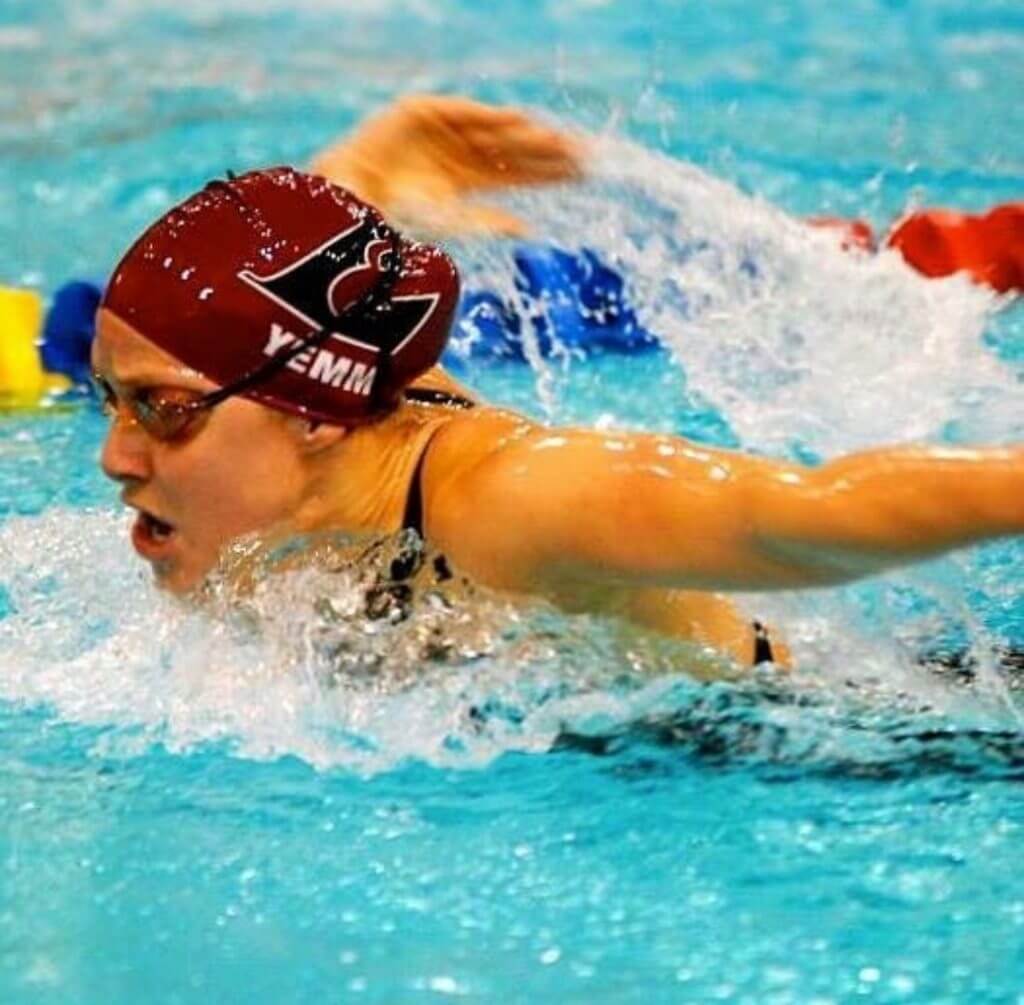
By Lianne McCluskey, Swimming World College Intern.
College transfer is a label many swimmers try to avoid. Transferring, particularly as a student-athlete, can have a negative undertone. You may be prone to sabotaging yourself with certain questions and doubts if you’re thinking about leaving your institution: What will my teammates think? Will the coach be mad at me? I chose this, so shouldn’t I be happy here? Do I really have to go through the college search process all over again?
However, choosing your college as a high school student isn’t an easy decision. There will always be some amount of stress associated with choosing the institution that is right for you. Your high school graduation day is supposed to be the day where you let out a sigh of relief, grasp your diploma, throw your cap in the air and move onto the next phase you’ve worked so hard for. As a graduating swimmer, it is more than just what you learn and execute in the classroom – it’s also about what you were able to accomplish as a high school athlete and how you proved your worth to college swim programs. No pressure, right?
For most swimmers, choosing a college isn’t just about the education – it’s about fitting in to the swim team culture. With over 5,300 colleges and universities to choose from, how does a swimmer find the right fit on the first try? As demonstrated in the graph below, research has shown that it is not uncommon for student-athletes to transfer from the college or university they started out at, but it is hard to face the reality of starting over again when the college experience didn’t begin the way you anticipated.
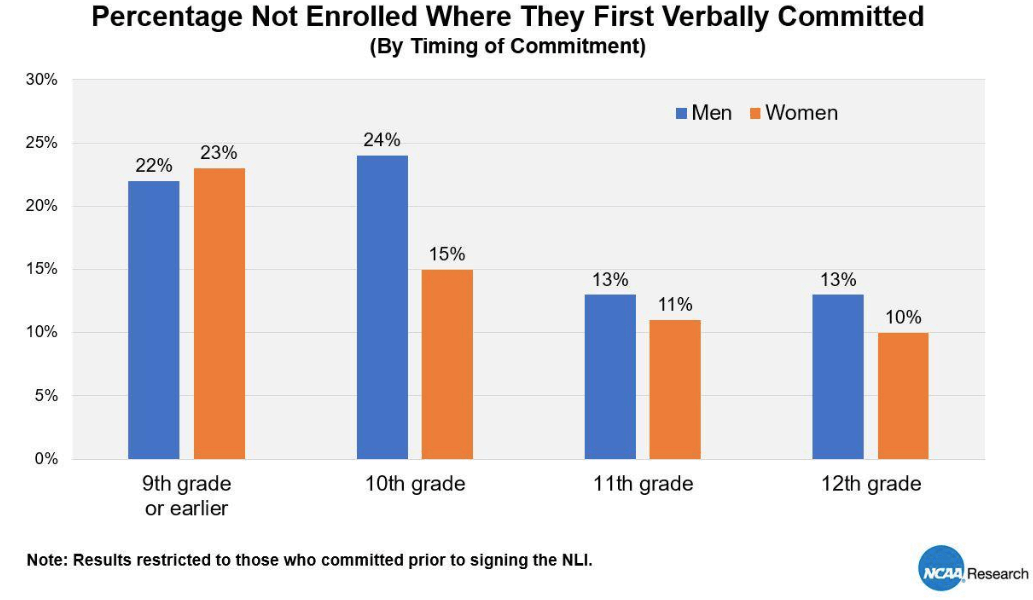
Photo Courtesy: NCAA Research
The rationale behind deciding to transfer can be extensive based on your circumstances. Regardless, you realize you made the wrong decision, so now what?
These transfer swimmers shared their best advice with Swimming World when altering the already not-so linear college swimming journey you may be about to embark on, and how to make the best of your situation.
1. Be open about your desire to transfer.
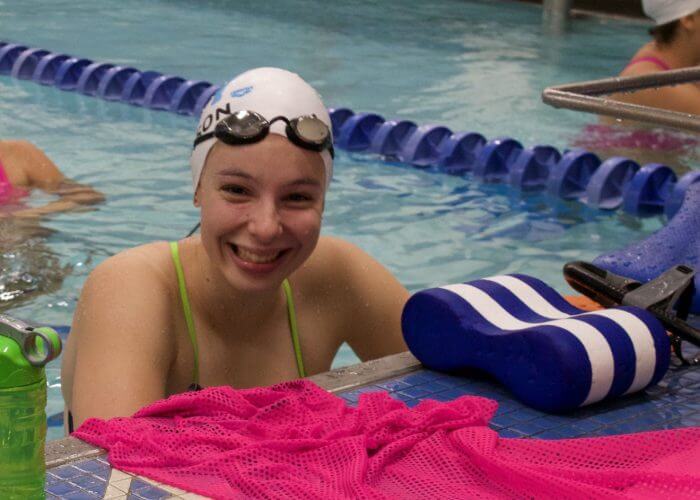
Photo Courtesy: Katherine Anderson
For Katherine Anderson, Smith College class of ‘20, she believes you should trust your instinct:
It was really hard for me to acknowledge the fact that I might need to transfer. I think a lot of people do it, but it is still a really stigmatized thing, especially in the world of athletics and among small liberal arts institutions. I think I knew in my heart much earlier than I was willing to acknowledge, and I remember when I realized I should look at other schools. My attitude changed; instead of saying “this all sucks,” I accepted there were other options for me out there.
Anderson was timid to open up to her team and coach about her desire to transfer but was surprised to discover that they were a lot more supportive than she expected. They weren’t taking it personally; she felt they genuinely wanted her to do what was right for her:
That is huge! You should open up to people about it if you want to leave the school. I wish I did this sooner; coaches and professors do their job because they want what’s best for you. I would say opening up is a huge thing – opening up to people and soliciting advice and support. It took a pretty major reassessment of the vision I had for what my college experience was going to look like to get myself to feel comfortable with this idea. We are so conditioned in a middle-class lifestyle that values a four-year college experience. We are told that we are going to have the best time of our lives, then graduate and move on. It’s something we are funneled into, so recognizing that the journey might be a little more circuitous for you is a huge step. Know that it is okay. It’s a good opportunity for a clean slate and mental cleansing.
2. Your team is your family.

Photo Courtesy: Taylor Jeronis
For Taylor Jeronis, La Salle class of ’16, being a member of a college swim team meant being accepted unconditionally for who you are. Jeronis found that as a Division I athlete, the swimmers on his team were the most important aspect of his college swimming experience:
My advice for anyone thinking of transferring is if the team doesn’t feel like family to you, don’t stay. I personally didn’t like how the first team I was on was run and how everyone treated each other, but after transferring, it felt extremely different. I felt I could trust people and actually open up to them about who I am, which can be very hard for LGBT athletes. Now, most of my best friends are my teammates from La Salle. I really appreciate and would never want to change that.
3. Don’t be afraid of the process.

Photo Courtesy: Greta Reichert
Greta Reichert, La Salle class of ’14, stopped swimming after her freshman year of college. When she went back sophomore year, she quickly realized the school wasn’t right for her, left and went home to re-think what she wanted her college experience to be like. Stepping away from swimming and taking a break after her freshman year was what she needed to realize she didn’t want to stop swimming, and it also gave her time to find the program that met the level of intensity she needed to be successful in the pool:
Do your research and don’t be afraid to ask questions. When you are transferring, go visit schools and talk to coaches. Obviously you are transferring for a multitude of reasons, but I think it’s important to make sure they have the academics you want. Also, meet the team. Don’t be discouraged if you feel like it’s failing [to transfer] – if anything, you should look at it as a new fresh opportunity. Doing the college search again can be daunting, but it can also be really fun.
4. Don’t give up on your passion.
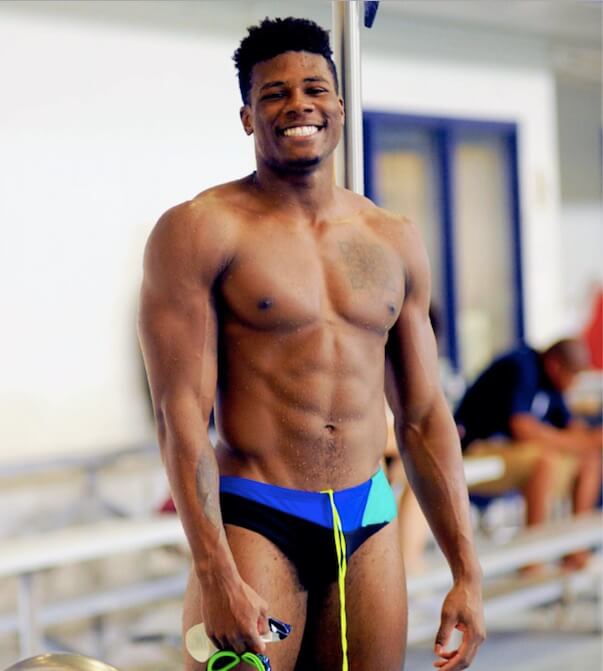
Photo Courtesy: Maalik Nixon
Although Maalik Nixon, Howard Univ. class of ’21, got into the business school that was most attractive to him academically, he realized after his freshman year that the experience wasn’t right without swimming. “For me – because I loved swimming so much – the idea of transferring didn’t really phase me.” Nixon said as much as he loved the first school he attended for everything it had to offer, he was not going to stay if he could not do his passion.
“I wouldn’t be happy if I couldn’t swim,” said Nixon. “I believe any college can give you the right academics, but for me, if I can continue my passion, then I am good with that.”
Although he did not swim his freshman year, he found the transition to Howard University was an easy one. “Coach Nic has definitely been there for me and showed me more love and support than any other coach I had talked to at the time,” said Nixon, who explained that Coach Nic Askew had been scouting him since his junior year of high school. Finding a coach who was going to be there for him was an important factor in choosing a program to join, but so was the team culture: “One of the biggest things I focused on was knowing that my team will be my family.”
His biggest piece of advice is to stay as open-minded as possible:
When it comes time to transfer from one school to another, you are essentially starting over. You have to think about the culture of the school you are going to go to compared to the one you are coming from; just be flexible. Be as accepting and understanding as possible, because there are going to be bumps. It can be a difficult process to get through, but once you find your school and your team, you will be much happier with the decision. It may be stressful and unfortunate, but you have to give yourself time to think and process what it is you really want to do. That way, in the end, you’re all for it.
5. Set yourself up for success.
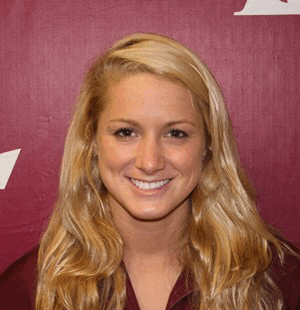
Photo Courtesy: Allie Yemm
Allie Yemm, University of Wisconsin – LaCrosse class of ’15, says her transfer was favorable for many reasons, two of which were the coaching theory and contribution she was able to experience at UWL:
I had the ability to feel that I was contributing more to the team than I did my freshman year. Success in the pool increased my confidence in the classroom in both my graduate and postgraduate studies for Physical Therapy. If anybody is considering transferring, particularly with swimming, I would like to give the advice that you’re not failing your first teammates or coaches. You have to focus on what will be better after swimming and college – and ultimately what is going to make you succeed in life.
6. Be proactive.
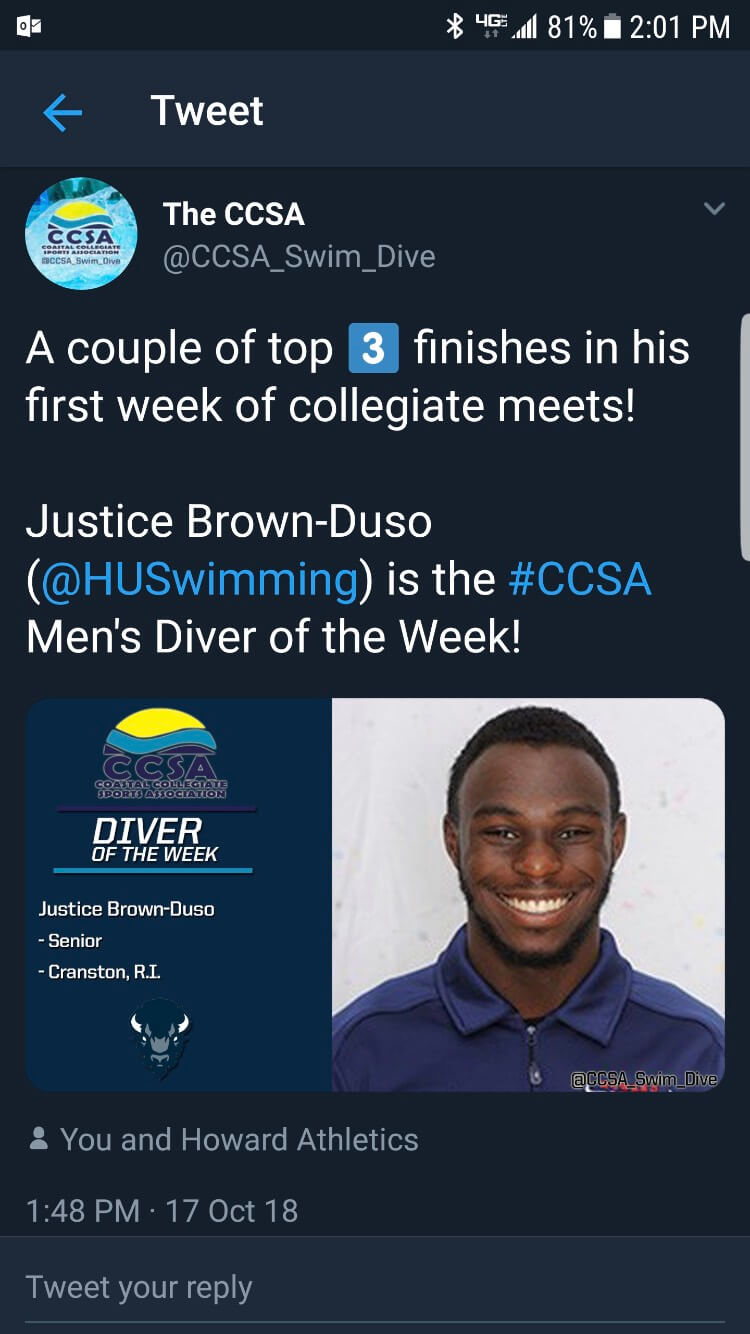
Photo Courtesy: Justice Brown-Duso, Howard University Swimmer and Diver.
Justice Brown-Duso, Howard Univ. ’19, spent his first year of college studying abroad in Madrid, Spain with the intention of coming back and transferring to Howard University the following year. Brown-Duso didn’t think he would want to attend Howard, but he said the students of Howard gave an unforgettable presentation at orientation that left him certain he would go there. “I couldn’t even pretend like I was not impressed,” said Brown-Duso. “From that moment on, I felt it in my soul that I had to be here.”
Brown-Duso did not get into the college on the first round, but he was determined to transfer there after his freshman year. “The best things in my life have happened to me only when I deviated from the path I tried to create for myself. At this point, I just take whatever happens as it comes.”
Brown-Duso is studying Public Relations and is on the Howard University Transfer Association board, helping transfer students get assimilated to the institution’s culture. His advice:
If you want to transfer, you need to look up the swimming program, find the coach’s email and reach out the them. Most coaches are happy to have someone reach out to them and say, “I am willing to put in the work.” Also, start reaching out to swimmers and start talking to them, because they are the best people to talk to about what the program is like. Be proactive in terms of figuring out if they’re the type of people you will want to train with.
The Takeaway
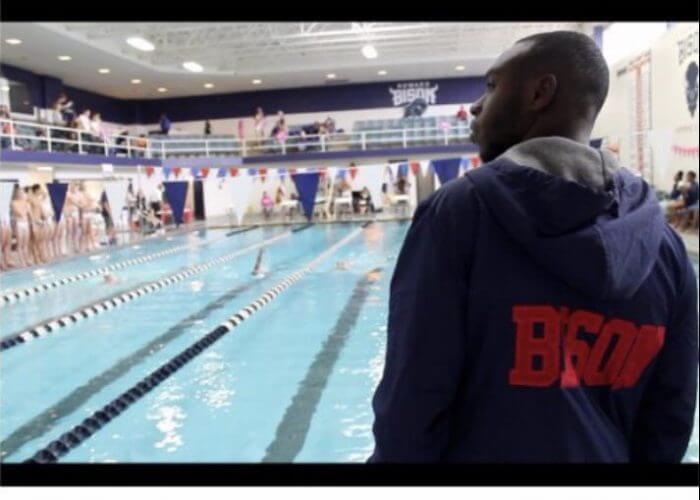
Photo Courtesy: Justice Brown-Duso
Making the decision to transfer involves important and sometimes difficult choices, but the biggest take away is this: trust your instinct and do what is right for you.
All commentaries are the opinion of the author and do not necessarily reflect the views of Swimming World Magazine nor its staff.




This is an excellent article. I was a transfer student. My sport was track and field. The first school I attended was the first time in life I had did not run. They had a program but not on the same level as the school I transferred to Howard University. It was different being a rookie Junior but I found a family that I still am connected to. My team mates and I are friends for life.